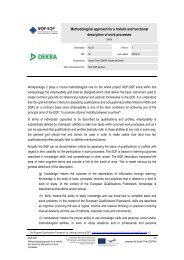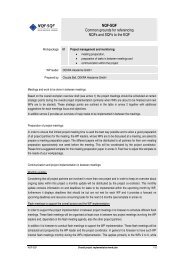Overview of National Qualification frameworks - Project-Nqf-Sqf
Overview of National Qualification frameworks - Project-Nqf-Sqf
Overview of National Qualification frameworks - Project-Nqf-Sqf
You also want an ePaper? Increase the reach of your titles
YUMPU automatically turns print PDFs into web optimized ePapers that Google loves.
1.4 Revisions <strong>of</strong> the NQF and plans for further developmentIn Austria, the NQF development is still work in progress. Currently, the definition <strong>of</strong> criteria for the NQF classification, <strong>of</strong> theclassification procedure and the NQF governance structure are being developed. The results <strong>of</strong> this work will enter into an NQFManual. This Manual will provide support throughout the entire NQF classification process. Moreover, it will also giveinformation on the main actors/bodies involved in NQF matters (governance structure) and stipulate their tasks.Another important question that is being looked into at present is connected to the legal status <strong>of</strong> the NQF. A working groupdealing with legal aspects was set up at the Ministry <strong>of</strong> Education. It is working out a proposal <strong>of</strong> whether and, if so, which legalframework should be given to the NQF. The proposal will be presented at the next meeting <strong>of</strong> the NQF Steering Group inJanuary 2011.The time schedule for the next steps in the NQF development process foresees that the proposed procedure for classifyingqualifications in the NQF (i.e. the criteria and procedure described in the above mentioned manual) will be tested in the firstsemester <strong>of</strong> 2011 (by “simulating “ classifications <strong>of</strong> selected qualifications. The concrete procedure will also be decided at thenext NQF Steering Group meeting.All qualifications – irrespective <strong>of</strong> the focus (general education qualifications and VET qualifications) and the learning context(for example initial VET or continuous VET) – will be classified to the NQF. Due to the complexity <strong>of</strong> the NQF developmentprocess and the fact that different ministries, departments and stakeholders need to be involved it was decided to work on the‘formal qualification area’ (comprising qualifications that are based on legal regulations, i.e. laws, directives, etc.) and the ‘nonformalqualification area’ separately. Although, for qualifications from both areas, the same classification principles will apply inthe end, the starting situation, regarding stakeholders in charge and governance principles, differs. Thus, working groups dealwith the questions attached to both areas separately.Other open questions and challenges include:__Communication between the different segments <strong>of</strong> the qualifications system;__Question whether and to which extent the NQF should be used to support national reforms;__Relation with EHEA (Bologna process): Good cooperation will be needed to establish conditions for better progressionpossibilities between different subsystems;__Allocation <strong>of</strong> qualifications to the NQF level - open questions, e.g. the issues <strong>of</strong> partial qualifications or parts <strong>of</strong> qualifications,how to understand and apply the principle <strong>of</strong> best fit (clear classification <strong>of</strong> existing qualifications is difficult in many casesbecause the generic descriptors <strong>of</strong> the EQF are underdetermined and do not allow a perfect fit), procedures and operationalstructures;__Can all qualifications <strong>of</strong> the same types be allocated to the same levels?__Questions relating to the learning outcomes approach in terms <strong>of</strong> concepts and sound assessment methodologies and tools.Central questions: how to balance outcome orientation and input factors? And: Are learning outcomes to be implemented in acoherent way across different subsystems (general, VET and HE)?__Integration <strong>of</strong> qualifications acquired in non-formal learning contexts and validation <strong>of</strong> non-formal in informal learning in theNQF development; issue <strong>of</strong> equivalences <strong>of</strong> qualifications acquired in different learning contexts;__Further involvement <strong>of</strong> stakeholders to strengthen ownership and commitment (the need to engage and include educationand training providers and universities); the challenge is to find agreements within a justifiable time period in view <strong>of</strong> thedifferent interests and objectives.In France revisions <strong>of</strong> the NQF are planned.In the Netherlands the Minister <strong>of</strong> Education, Culture and Science has received the advise which had been asked. Now theparliament will discuss the policy response <strong>of</strong> the Minister and formalize the NLQF. It is expected that the linking with the EQFwill be in the second part <strong>of</strong> 2011.In December 2010 the Malta <strong>Qualification</strong>s Council will launch a consultation document entitled: “Classifying <strong>Qualification</strong>s: A<strong>National</strong> Awards System Referenced to the Malta <strong>Qualification</strong>s Framework: a proposal”. The Council is proposing the shiftfrom a <strong>National</strong> <strong>Qualification</strong>s Framework to a <strong>National</strong> <strong>Qualification</strong>s and Credit Framework whereby short courses with aminimum <strong>of</strong> four ECTS credits can be level rated to any <strong>of</strong> the levels from one to seven <strong>of</strong> the MQF. This proposal is the result<strong>of</strong> demand from students and public and private training providers including employers who believe that all learning must bevalued in order to enhance Lifelong Learning.NQF-SQF:"This project has been funded with support from8/9<strong>Overview</strong> <strong>of</strong> <strong>National</strong> <strong>Qualification</strong>prepared by 3s research laboratory<strong>frameworks</strong>the European Commission. This publicationreflects the views only <strong>of</strong> the author, and theCommission cannot be held responsible for anyuse which may be made <strong>of</strong> the informationcontained therein."




